Travel
Skip the line: 6 airports that let you check your bags remotely
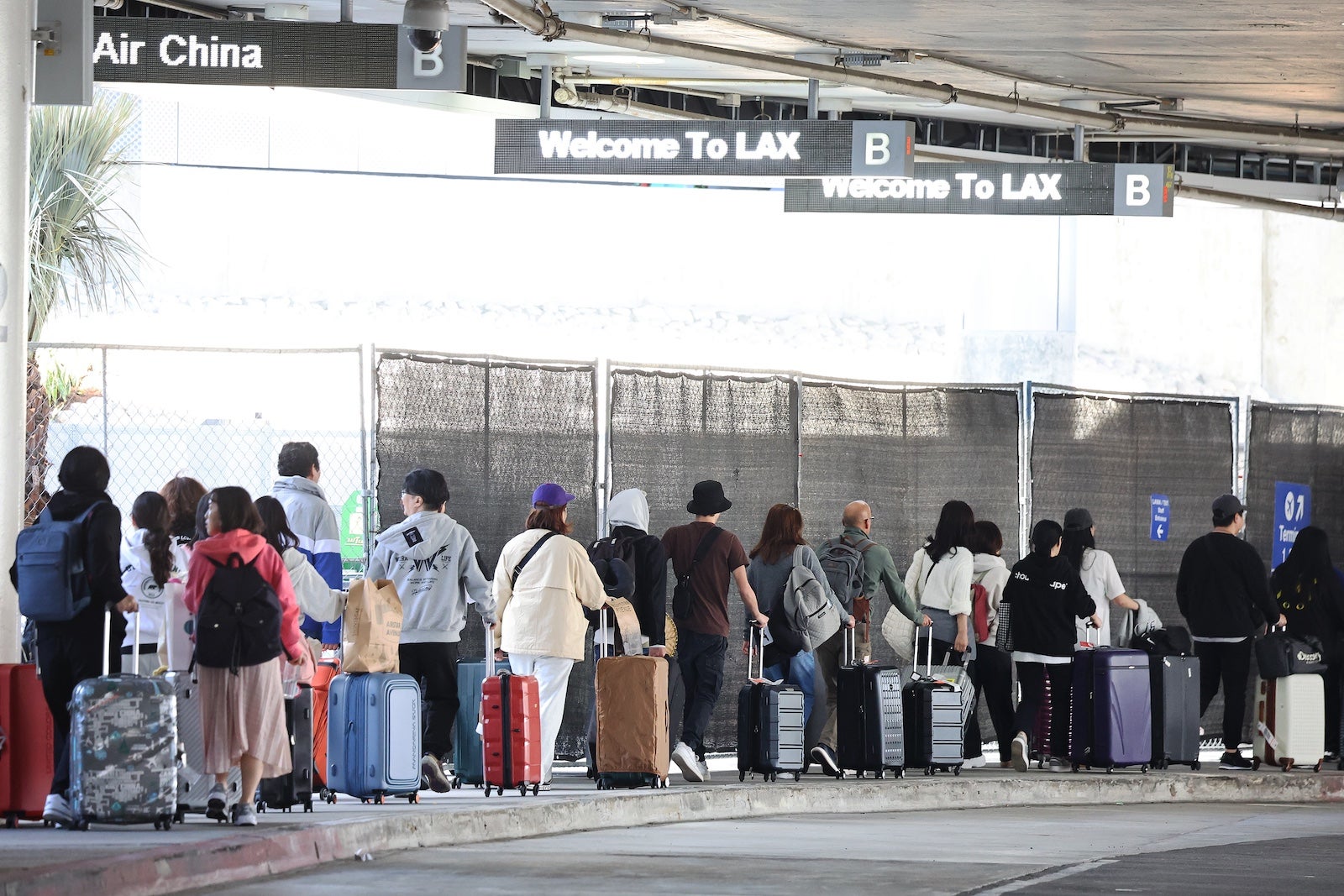
As airports and airlines attempt to innovate, one feature is becoming more widely available for travelers: the ability to check bags remotely before even stepping foot inside an airport.
During the bag check process, passengers can check in for their flights and receive boarding passes while dropping off their luggage at a mobile kiosk.
Bags, Inc. provides remote check-in for travelers at various locations, including airports, hotels, convention centers, parking areas, rental car areas and cruise ships.
San Francisco International Airport (SFO) is the latest airport to launch its remote airline check-in service in partnership with Bags Inc., but this service is available at five other airports as of Dec. 10:
- Harry Reid International Airport (LAS)
- Charleston International Airport (CHS)
- Louis Armstrong New Orleans International Airport (MSY)
- William P. Hobby Airport (HOU)
- Tampa International Airport (TPA)
You must fly domestically on one of eight participating airlines at these airports. Carriers include Alaska Airlines, American Airlines, Delta Air Lines, Frontier Airlines, JetBlue Airways, Southwest Airlines, Spirit Airlines and United Airlines. Airline availability varies by airport.
This service is free, but airline baggage fees still apply as they would when checking bags curbside or inside with the airline.
Typically, bags must be checked at least 90 minutes ahead of flight departure, within operating hours.
Here’s all you need to know about remote check-in by location.

Daily Newsletter
Reward your inbox with the TPG Daily newsletter
Join over 700,000 readers for breaking news, in-depth guides and exclusive deals from TPG’s experts
San Francisco International Airport
The airport offers remote airline check-in service to those on domestic Alaska, American, Delta and JetBlue flights.
At SFO, travelers can remotely check their bags on Level 5 of the airport’s long-term parking garage or Level 1 of the rental car center. From each location, travelers can connect to the airport terminals via the AirTrain.
Remote airline check-in is available at SFO from 4 a.m. to 8 p.m. daily.
Harry Reid International Airport
The Curbside Concierge at LAS is in the airport’s Remote Lot across from the Rent-A-Car Center and at the departures curb in Terminal 3. It is available Thursday through Monday from 4 a.m. to 2:30 p.m. in the Rent-A-Car Center and 4 a.m. to 12 p.m. in Terminal 3.
Currently, it’s restricted to domestic flyers on American, Delta, Frontier, JetBlue, Southwest and United.
You must check your bag at least 90 minutes before your flight’s departure time.
Charleston International Airport
Charleston’s Check ‘N Go is a free bag check program for domestic flights. It is located in the airport’s Daily Parking Garage in the Rental Car Center and curbside at the terminal.
Hours are 3:30 a.m. to 7 p.m. curbside and 3:30 a.m. to 10 p.m. in the parking garage.
“80% of passengers standing in check-in lines want to drop bags, and being able to alleviate that with CHS Check N Go makes it a much better passenger experience,” Elliott Summey, CEO of Charleston International Airport, said via email.
Louis Armstrong New Orleans International Airport
Airline Baggage Check-in is available at MSY in the Park MSY Express economy parking garage at 800 Airline Dr.
This service is available for American, Delta, United and Spirit passengers from 4 a.m. to 4 p.m. daily.
William P. Hobby Airport
Check ‘N Fly Baggage Check-In Service is available 24/7 at HOU for U.S. American and Delta flights.
Travelers who valet in the Valet parking lot can access this service, so long as they check their bags at least an hour before their flight.
Tampa International Airport
At TPA, you can check in remotely in the Rental Car Center/Multi-Modal Facility or curbside. Both connect to the airport via the SkyConnect train.
Remote bag check hours are Monday through Friday from 7 a.m. to 4 p.m. and Saturday and Sunday from 5 a.m. to 5 p.m.
Airport valet
In addition to its remote check-in service, Bags, Inc. also offers valet services for travelers. With a Metropolis valet operator, travelers can park their cars, check in for their flights, check their bags and receive boarding passes.
Valet is currently available at HOU, San Antonio International Airport (SAT), Appleton International Airport (ATW) and Portland International Airport (PDX).
Port valet
At Orlando International Airport (MCO), Fort Lauderdale-Hollywood International Airport (FLL), Miami International Airport (MIA) and Seattle-Tacoma International Airport (SEA), there’s a remote check-in service available for cruise ships at cruise ports.
For example, JetBlue offers onboard cruise ship check-in for travelers docking at Port Canaveral and flying out of MCO; it offers the same for those docking in Port Everglades and Port of Miami and catching a flight out of FLL.
This is also the case for Alaska, American, Delta, Horizon, Southwest and United flights departing SEA after 12 p.m. Per the Port of Seattle, cruisegoers who sign up for this will receive their boarding passes and luggage tags on the final night of the cruise.
“Customers leave bags outside of the cruise ship estate room the night before disembarking and do not see the bags again until their home airport on the claims carousel,” a Bags spokesperson said via email. “Bags manages all logistics off the ship to the airport.”
Upon arrival at SEA, Bags will check your luggage to your final destination, but you can also track your bags online.
Bottom line
While reservations are not required to use remote check-in, some airport parking lots require advance bookings. Be sure to double-check entry requirements at your airport.
Remote airline check-in can help you save time at the airport this holiday season and beyond. Even better? It’s free.
Related reading:
Travel
Chase Sapphire Preferred vs. Ink Business Preferred: Which $95-a-year card should you get?

Editor’s note: This is a recurring post, regularly updated with new information and offers.
With so many fantastic travel rewards credit cards available, including some with large sign-up bonuses and phenomenal benefits, you might have difficulty choosing one (or a combination) that suits your needs. This can become even more overwhelming if you qualify for a small-business credit card, which opens the door to many additional options.
Two of the most valuable mid-tier cards from Chase include the Chase Sapphire Preferred® Card and Ink Business Preferred® Credit Card, which have similar benefits — including earning Ultimate Rewards points and annual fees of $95.
While they make a pretty powerful team, you might only want or be eligible for one or the other — for instance, if you are not looking for a business card or are nearing your 5/24 limit with Chase. Today, we will look at how these cards stack up against each other and help you decide whether one or both deserve a place in your wallet.
Sapphire Preferred vs. Ink Business Preferred comparison
| Chase Sapphire Preferred | Chase Ink Business Preferred | |
|---|---|---|
| Annual fee | $95 | $95 |
| Welcome bonus | Earn 60,000 points after spending $4,000 on purchases in the first three months of account opening. | Earn 90,000 bonus points after spending $8,000 on purchases in the first three months from account opening. |
| Earning | 5 points per dollar on hotels and car rentals purchased through Chase Travel℠
3 points per dollar on dining worldwide 2 points per dollar on all other travel 1 point per dollar on everything else |
3 points per dollar on up to $150,000 spent in combined purchases on travel, shipping, internet, cable, phone, social media & search engine advertising (each account anniversary year)
1 point per dollar on everything else |
| Trip cancellation/interruption | Up to $10,000 per person, $20,000 per trip | Up to $5,000 per person, $10,000 per trip |
| Trip delay | 12 hours, up to $500 per ticket | 12 hours, up to $500 per ticket |
| Lost & delayed luggage | 6 hours, up to $100 per day up to five days
Up to $3,000 for lost bags |
6 hours, up to $100 per day up to five days
Up to $3,000 for lost bags |
| Rental car coverage | Primary | Primary, business-related rentals |
| Purchase protection | Up to $500 per claim, $50,000 per account | Up to $10,000 per claim, $50,000 per account |
| Extended warranty | Additional one year for items with less than three years of warranty
Up to $10,000 per item, $50,000 per account |
Additional one year for items with less than three years of warranty
Up to $10,000 per item, $50,000 per account |
| Cellphone protection | None | $100 deductible, up to $1,000 per claim, maximum of three claims per 12-month period |
Sapphire Preferred vs. Ink Business Preferred welcome offer
The Chase Sapphire Preferred is currently offering a welcome offer of 60,000 Ultimate Rewards points after spending $4,000 on purchases in the first three months of account opening. The Chase Ink Business Preferred currently offers 90,000 bonus points after spending $8,000 on purchases in the first three months from account opening.
According to TPG’s January 2025 valuation, Ultimate Rewards points are worth 2.05 cents each, making these bonuses worth up to $1,230 and $1,845, respectively.
While the Ink Preferred cleans the table when it comes to bonus value, that $8,000 minimum spending requirement might be difficult for some businesses to hit, so you’ll want to consider your spending power when deciding which card to get.
Winner: Ink Business Preferred. Its welcome offer provides more value.
Related: 5 reasons to get the Ink Business Preferred

Daily Newsletter
Reward your inbox with the TPG Daily newsletter
Join over 700,000 readers for breaking news, in-depth guides and exclusive deals from TPG’s experts
Sapphire Preferred vs. Ink Business Preferred benefits
Both cards offer phenomenal travel protections that are quite similar, though the Sapphire Preferred is slightly more comprehensive.
Each card includes trip cancellation and interruption insurance. With the Ink Business Preferred, you’re covered for up to $5,000 per trip for nonrefundable travel expenses, up to $10,000 per trip. The Sapphire Preferred covers up to $10,000 per person or up to $20,000 per trip. Trip delay reimbursement for things like overnight lodging or meals kicks in at 12 hours with the Ink Business Preferred and the Chase Sapphire Preferred. Both cards also cover up to $500 per ticket in the event of a covered delay.
The baggage delay insurance is identical on both cards: up to $100 per day for up to five days when your bag is delayed or misdirected for more than six hours. Lost luggage insurance with both cards is up to $3,000 per passenger.
Both cards also offer primary rental car coverage, which is a fantastic benefit and alleviates the expense and hassle of dealing with an agency or your own insurance if things go wrong with a rental. However, the Ink Business Preferred’s benefits state that your rental must be for business purposes for this protection to kick in.
Both cards also provide purchase protection and extended warranty coverage as well. The Chase Sapphire Preferred offers purchase protection of up to $500 per claim with a $50,000 limit per year, and the Ink Business Preferred offers a slightly elevated coverage of $10,000 per claim with the same $50,000 maximum
In addition, both cards provide extended warranty coverage for eligible items by extending a manufacturer’s warranty by one additional year for items with less than three years of warranty. In case of a replacement or repair the cards each provide up to $10,000 per item with a $50,000 maximum per account.
Finally, the Ink Business Preferred provides cellphone protection when paying the monthly bill. The card covers up to $1,000 in case of repair or replacement with a $100 deductible.
Beyond travel protections, the Chase Sapphire Preferred offers a statement credit each account anniversary of up to $50 on hotel stay purchases through Chase Travel℠. In addition, cardholders also receive 10% anniversary bonus points each year. The bonus is based on your total spend during the account anniversary year at a rate of 1 point for every $10 spent.
Finally, the Sapphire Preferred also provides at least one year of complimentary DoorDash DashPass membership (activate by Dec. 31, 2027) and up to $10 off a month on non-restaurant DoorDash orders.
Winner: Sapphire Preferred. Its benefits outclass those on the Ink Business Preferred.
Related: Why the Sapphire Preferred is the top travel rewards card year after year
Earning points with the Sapphire Preferred vs. Ink Business Preferred
The cards’ earning rates are very different. The Chase Sapphire Preferred earns 5 points per dollar on hotels and car rentals purchased through Chase Travel℠, plus 2 points per dollar on a broad range of travel purchases, including airline tickets and hotel stays and taxis, tolls and parking. The card also earns 3 points per dollar on dining worldwide and 1 point per dollar on everything else, all with no earning caps.
The Ink Business Preferred earns a solid 3 points per dollar on the first $150,000 spent each account anniversary year on a combination of travel (the same broad category as with the Sapphire Preferred), shipping purchases, internet, cable and phone services, and advertising purchases made with social media sites and search engines. It earns 1 point per dollar on everything else.
There are a couple of things to keep in mind here. First, if dining is one of your major expenses, the Chase Sapphire Preferred is the way to go. However, if travel is your main outlay, the Ink Business Preferred’s 3-points-per-dollar bonus edges out the Sapphire Preferred’s 2-points-per-dollar rate in this category.
Another consideration is that if you are a business owner and spend a lot of money in the card’s other bonus categories, you might hit that $150,000 annual cap sooner than you think. Still, to make the Sapphire Preferred worth it over the Ink Business Preferred strictly in terms of travel, you’d have to spend $225,000 or more in travel purchases each year instead of $150,000 with the business card.
Winner: Tie. The categories differ significantly, and your preference will depend on your spending habits.
Redeeming points with the Sapphire Preferred vs. Ink Business Preferred
Both cards earn Ultimate Rewards points, some of the most valuable around.
You’ll get the highest value from your points by transferring them to one of Chase’s 14 airline and hotel loyalty partners.
Cardholders of either product can also redeem points directly for travel through the Chase travel portal to get 1.25 cents per point in value and have the option to redeem points for eligible categories through Pay Yourself Back.
Winner: Tie. You’ll get the same redemption options on either card.
Related: 6 of the best Ultimate Rewards sweet spots
Transferring points with the Sapphire Preferred vs. Ink Business Preferred
Ultimate Rewards can be transferred to 11 airline partners, including British Airways, Southwest and United, and three hotel programs: Marriott Bonvoy, World of Hyatt and IHG One Rewards.
These transfer partners can provide great value. For example, TPG managing editor Madison Blancaflor was able to snag a last-minute premium economy ticket from New York to Amsterdam using Flying Blue for just 20,500 Ultimate Rewards points using a transfer promotion.
Winner: Tie. You’ll get the same redemption options on either card.
Related: How I used a transfer bonus to get a lie-flat seat to London for just 21,000 points
Should I get the Sapphire Preferred or Ink Business Preferred?
You should consider whether you want to carry a personal credit card or one for business. If you prefer a personal credit card and can benefit from the Chase Sapphire Preferred‘s superior travel protections, not to mention its handy dining category bonus, it might be the better option for you.
Still, the Sapphire Preferred and Ink Business Preferred combination is a powerful match-up that could boost your travel rewards earnings into the stratosphere.
Bottom line
If you’re trying to decide between the Chase Sapphire Preferred and Ink Business Preferred, think about whether you want a business or personal card, which one’s category bonuses you will best be able to take advantage of, and which one’s travel protections are better suited to your needs.
The two products are among the best travel rewards credit cards currently available, and carrying both is a good way to boost your points earnings on an ongoing basis.
To learn more, read our full reviews of the Chase Sapphire Preferred and Ink Business Preferred.
Apply here: Chase Sapphire Preferred
Apply here: Ink Business Preferred
Travel
American Airlines’ plan for 2025: New biz-class suites, more lounges and improved Wi-Fi
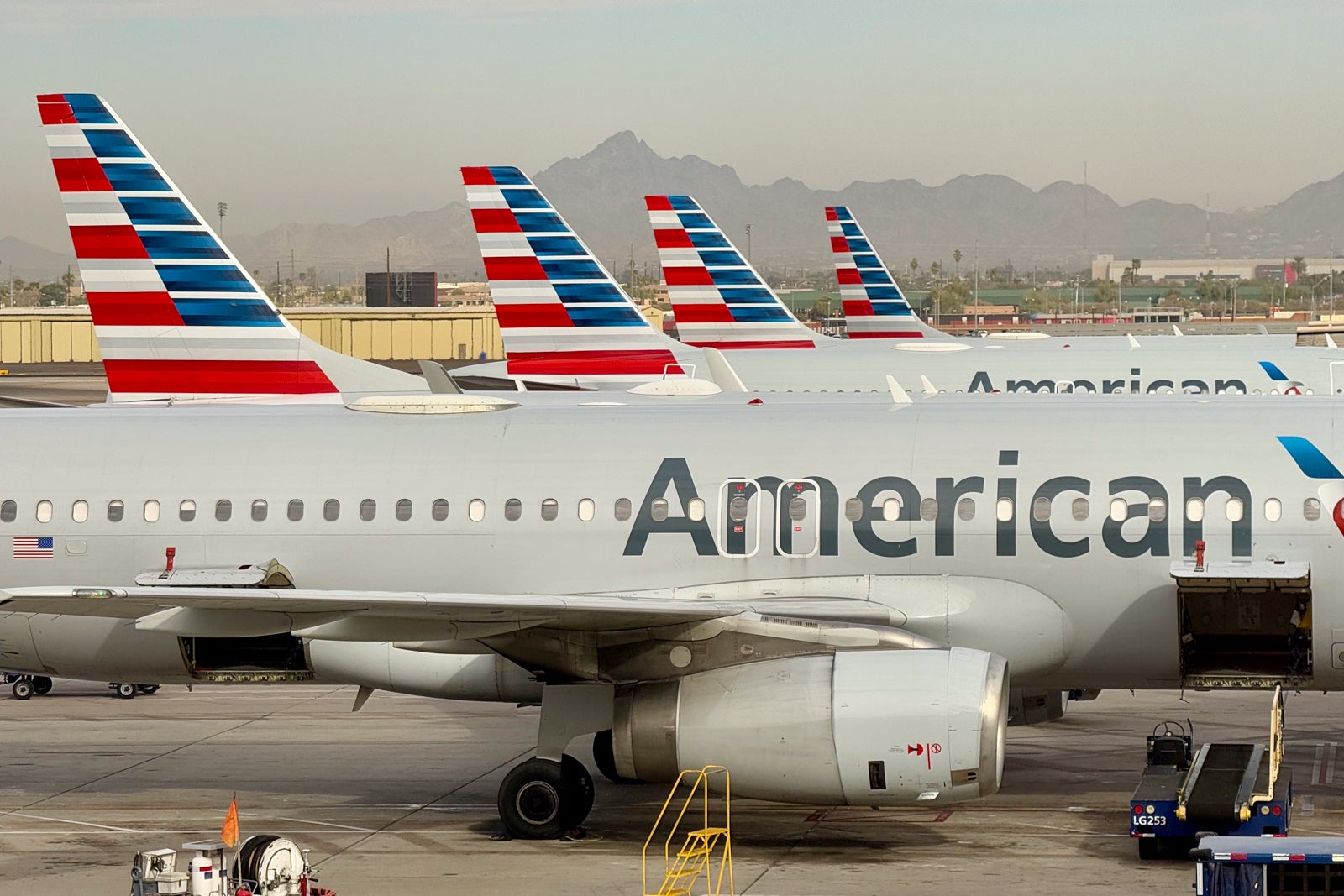

Travelers have a lot to look forward to from American Airlines in 2025: New business-class suites, premium lounges and satellite Wi-Fi are coming, as well as a full recovery of its Chicago and Philadelphia hubs.
Those are just a few items that American CEO Robert Isom and other executives outlined during the airline’s fourth-quarter earnings call Thursday. The outlook is mostly bright with, as Isom put it, “robust demand across the board” for air travel.
But even those positive words and modest profits in the fourth quarter and full year of 2024 were not enough to appease investors. American’s forecast of a first-quarter loss — historically the weakest quarter of the calendar year for U.S. airlines — sent the airline’s stock down nearly 9% to $17.03 per share on Thursday.
Pro tips: The biggest mistakes people make with travel rewards credit cards
“I really feel like we’ve got all the pieces in the puzzle in place to really take off,” said Isom. “Now, we’ve got some work to do putting that together and selling, and telling our story better, but we are the largest in the best market in the world here in the U.S.”
Here are five key takeaways from American’s earnings call.
American will debut its new Flagship Suites
American plans to introduce its new Flagship Suite business-class seats on new Airbus A321XLR and Boeing 787-9 planes later this year, Isom said. The suites are part of a larger investment in premium offerings that includes new premium economy seats and other onboard upgrades.
First unveiled in 2022 as part of the boom in premium — particularly premium leisure — travel demand following the pandemic, the new Flagship Suites were supposed to enter service in 2024. However, the numerous supply chain issues that continue to plague the aerospace industry delayed their debut to this year.
The new seats and cabins will also be installed on American’s largest aircraft, the Boeing 777-300ER, at a later date. Isom did not offer an updated timeline for the retrofits that were previously set to begin in late 2024.
As part of the cabin upgrades, American will retire the Flagship First product that it currently offers on its small fleet of premium transcontinental Airbus A321s — the A321Ts — that flies between New York and both Los Angeles and San Francisco, and on the 777-300ER. The airline does not yet have a date for the final flight of Flagship First.
Philadelphia will get a Flagship Lounge
American plans to open a new Flagship Lounge at its Philadelphia International Airport (PHL) hub this summer, Isom said. The lounge will be in the A-West terminal used by American’s international flights and available only to travelers booked in long-haul international first or business class, as well as certain elite frequent flyers.
The lounge comes as American builds back its Philadelphia gateway. It will add new nonstops to Edinburgh and Milan from the airport this summer that, coupled with other international capacity increases, will result in more long-haul flights and seats from Philadelphia during the peak June-to-August period for the first time since the summer of 2019, schedule data from aviation analytics firm Cirium Diio shows.
Travel perks: Domestic lounges that are worth going out of your way for
American will complete its postpandemic schedule recovery
Philadelphia is not the only American hub set for a full recovery this year. The airline plans to focus its “low single digit” capacity growth in 2025, as Chief Financial Officer Devon May put it Thursday, on recovery of its northern hubs, including at Chicago’s O’Hare International Airport (ORD) and Philadelphia.
This recovery will be driven by the return of regional jets that were idled early in the pandemic, and complemented with the delivery of 40 to 50 new airplanes in 2025, May said.
“It’s no secret that we have had to build back our network,” said Isom. “I feel great that in 2025 we’re going to have our regional fleet fully deployed, and what that’s going to allow us to do is better fill out some of the hubs that are, quite frankly, ready and willing to support the network.”
In 2024, flights at American’s Chicago and Philadelphia hubs were down by about a quarter from five years earlier, Cirium Diio data shows.
High-speed Wi-Fi is coming to American’s regional jets
American plans to begin, and finish, the installation of new high-speed, satellite Wi-Fi on its two-class regional jets in 2025. This includes the Embraer E170s and E175s, and CRJ-700s and -900s in the American Eagle fleet.
“We’re really interested that our customers have access to Wi-Fi, satellite-based Wi-Fi, on everything that they fly,” said Isom.
American’s fleet of single-class regional jets — Embraer ERJ-145s — will not receive the new high-speed inflight connectivity.
Asked by Wall Street analysts if American was reconsidering its stance on in-seat entertainment screens, Isom said the airline will upgrade its in-seat entertainment offerings on long-haul aircraft, including the A321XLR and 787, but has no plans to offer the popular entertainment option on its domestic narrow-body fleet.
TPG’s picks: The most exciting new airline routes for 2025
Optimism for air traffic control improvements
“It’s imperative that we keep investing in air traffic control,” Isom said when asked his view of the new Trump administration in Washington. “There’s a lot of growth that is hoped for in the industry but we can’t [just] keep on jamming more aircraft in the skies.”
“President Trump and the administration recognize the importance of the industry to commerce,” he added.
While Isom did not elaborate on what air traffic control investments should look like, President Donald Trump has previously supported proposals to privatize the air traffic control system. Investments could also include the long-discussed and much-delayed “NextGen” upgrades that include modern, GPS-based flight tracking systems.
Related reading:
- When is the best time to book flights for the cheapest airfare?
- The best airline credit cards
- What exactly are airline miles, anyway?
- 6 real-life strategies you can use when your flight is canceled or delayed
- Maximize your airfare: The best credit cards for booking flights
- The best credit cards to reach elite status
- What are points and miles worth? TPG’s monthly valuations
Travel
6 reasons to book a balcony cabin on your next cruise
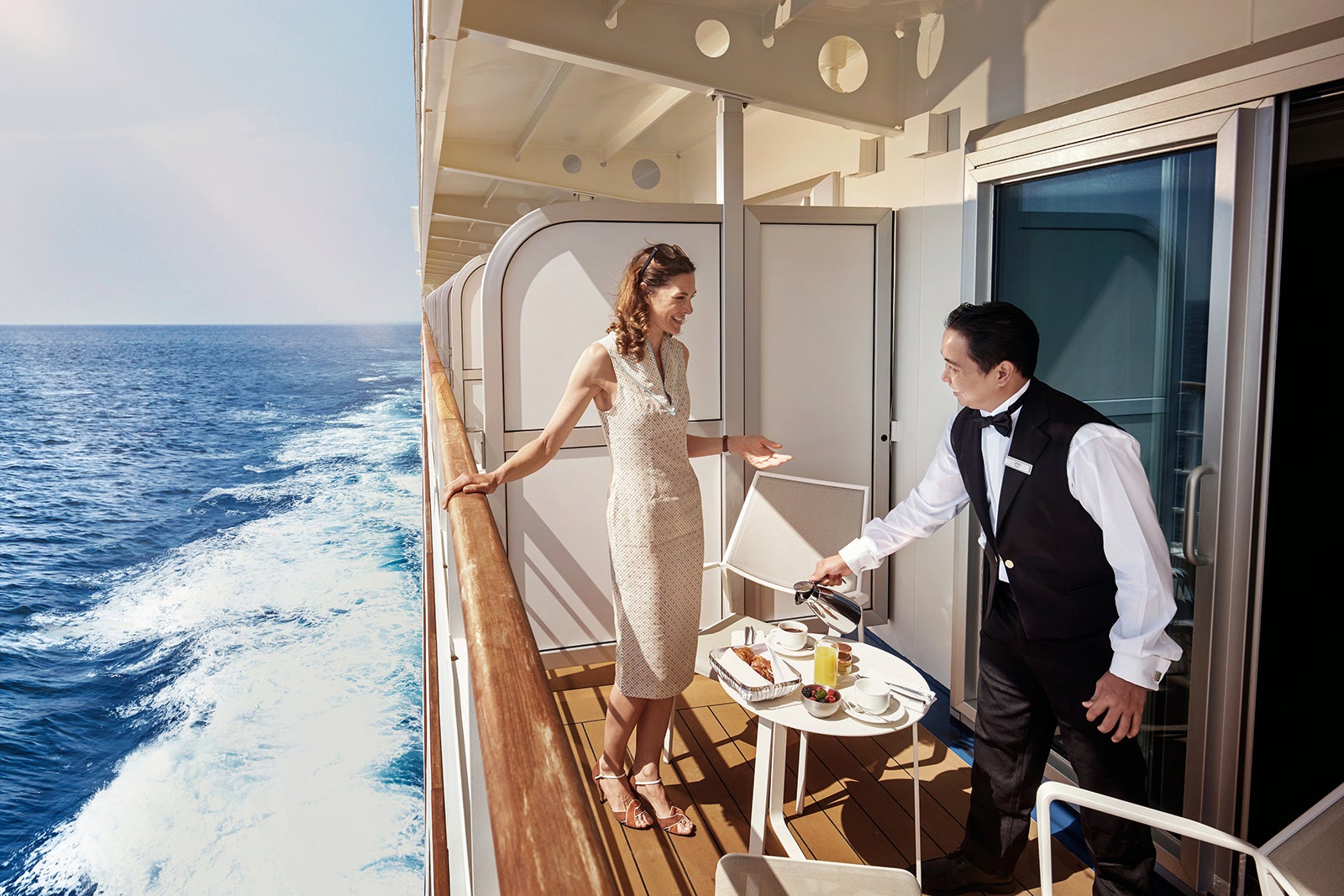
Is it worth paying extra for a balcony cabin?
As someone who has written about cruising for more than two decades, I have heard that question a lot, and I know where I stand on it: Absolutely.
You’ll almost always pay more for a balcony cabin on a ship than for a cabin that just has a window — the latter being known in industry lingo as an “ocean-view” cabin. But often, it’s not outrageously more.
For example, at the time of this story’s publishing, fares for balcony cabins on some 2026 cruises out of Galveston, Texas, were just 4% more than fares for ocean-view cabins. (Specifically, that was the differential on seven-night sailings in September 2026 on Royal Caribbean’s Symphony of the Seas; the differentials for sailings out of Galveston the same month on MSC Cruises‘ MSC Seascape and Carnival Cruise Line‘s Carnival Dream were a higher 14% and 19%, respectively.)
Ocean-view cabins on the same three ships, in turn, were running 14% to 37% more than windowless inside cabins — the third major category of cabins you’ll find on ships.
These differentials aren’t insignificant, of course. For many vacationers on a tight budget, even a small increase in price for a room can be a deal breaker.
Related: 8 cabin locations on cruise ships that you should definitely avoid
In addition, some people with extra money to spend would rather splurge on shore excursions or other extra-charge items, such as shipboard spa treatments, than on a higher-priced cabin. That makes perfect sense to me. What is most important to one person on a vacation may be different from what is important to another person.
That said, here are six things you’ll get out of a balcony cabin that I think make it worth the extra cost if you have the money to spare.

Daily Newsletter
Reward your inbox with the TPG Daily newsletter
Join over 700,000 readers for breaking news, in-depth guides and exclusive deals from TPG’s experts
The fresh air
For me, this is the big reason to get a balcony cabin. At any time of the day — or night — you can slide open your balcony door and breathe in the fresh ocean air. You’ll also be able to hear the sounds of the waves as they crash against the bow of your ship. It’s a wonderfully soothing, rhythmic sound — so soothing that it can lull you to sleep.
Even on cruises in cold weather, there’s nothing quite like stepping out on a balcony for a few minutes or more to soak in the salty breeze. It’s invigorating.
Related: 5 reasons to turn down a cruise ship cabin upgrade
The fresh air available on balconies also can be a lifesaver — at least for your sanity — should you find yourself confined to your cabin due to an illness. That can happen if you come down with something like norovirus or COVID-19 on a ship. This happened to cruisers quite a bit during the height of the COVID-19 pandemic, and many of the people who were isolated in cabins without balconies for days weren’t thrilled with the lack of access to fresh air.
I can attest personally to the fact that it isn’t a great situation to be stuck in a room that doesn’t have a balcony for days. In late 2020, I was isolated in a cabin without a balcony for four days during a COVID-19-related ship quarantine, even though I wasn’t sick. I would have paid just about anything during those days for even the smallest bit of outdoor space.
The ultimate privacy
Cruise ships can be crowded places. Even on luxury ships, which generally have more space per passenger than mass-market vessels, you’ll likely be sharing the pool deck with dozens or even hundreds of other people. On some of the biggest vessels, such as Royal Caribbean’s giant new Icon of the Seas, you’ll compete for deck chairs with literally thousands of others. Private, it isn’t — nor is it often quiet. The pool decks of cruise ships can be noisy places.
If you have a balcony cabin, you’re always guaranteed an outdoor space where you can lounge for a few hours in complete privacy. And, in general, it will be a quiet outdoor space. While you will sometimes hear the sounds of other passengers nearby on their own balconies, for the most part, it’s a much more serene experience than being up on the top deck.
The best views
Balcony cabins don’t just offer you access to an outdoor space. They typically also offer you a great view of the outdoors from inside your cabin.
This is because the doors leading to balconies in balcony cabins usually are made almost entirely of glass running from floor to ceiling. Often, a balcony cabin will have both a floor-to-ceiling glass door leading to the outside as well as floor-to-ceiling windows that make for what is, in effect, an outward-facing wall made entirely of glass. Ocean-view cabins without balconies, by contrast, often have just a single window. Some just have portholes.
Related: 7 reasons you should splurge for a suite on your next cruise
The result is that you’ll generally have a much better view of the outdoors from the inside of a balcony cabin than from the inside of an ocean-view cabin.
The chance for wildlife encounters
Speaking of the view, you’re going to be able to see passing wildlife much better from a balcony cabin than an ocean-view cabin. If you stand at the edge of your balcony railing, you’ll be able to twist your head side-to-side to get a 180-degree view of the passing waters. That’s two or three times the field of vision that you’ll get from gazing out a cabin window.
Related: The 5 most desirable cabin locations on any cruise ship
I’ve found balcony cabins to be particularly wonderful to have in wildlife-filled destinations such as Alaska, where ships sometimes pass such spectacular creatures as whales in the water or bears along the shoreline. Often, the captain of a vessel will spot such animals first and then make a public announcement to passengers to head to the sides of the ship to look. If you’re in a balcony cabin (and on the correct side of the ship), you’ll be gazing down upon these sights in no time.
The chance for a romantic dinner
There’s nothing that says romance like a private dinner for two under the stars. And that’s exactly what you can do on your balcony on many cruise ships, with the waves as a background soundtrack.
Some upscale lines will arrange an elegant, private dinner for two on your balcony — think white tablecloths, multiple courses, the works — at no extra charge. Among mass-market lines, Princess Cruises offers an Ultimate Balcony Dining experience at an extra charge that brings a four-course meal, Champagne and cocktails or a glass of wine. In the case of the Princess offering, you’ll even get fresh flowers and a (flameless) candle on your table.
The perfect spot to watch a port arrival
I’m a big fan of getting up early to watch as cruise ships pull into ports. In some places, such as New York and Sydney, the experience is a highlight of the trip. The arrival into New York, in particular, is one of the great cruise experiences. Your ship will glide under the giant Verrazzano-Narrows Bridge (often with just feet to spare) before passing the Statue of Liberty and the skyline of lower Manhattan.
Related: What’s a cruise cabin guarantee — and will it save you money?
But as spectacular as they are, these arrivals into ports often take place very early in the morning, before you (or at least your bed-head hair) may be ready to go out into the world. What’s great about having a balcony is that you don’t have to get dressed and ready for the day to watch a port arrival. You can just roll out of bed in your jammies and head out on the balcony.
Of course, you have to be on the correct side of the ship to get certain views. Arriving in New York, there is an allure to watching the arrival from both sides of a vessel. From the port side, you’ll get the best view of the Statue of Liberty. But the starboard side brings you the best views of downtown Manhattan, assuming you’re on a vessel heading to a midtown pier.
Bottom line
Balcony cabins cost more than ocean-view cabins or windowless “inside” cabins. But they can be worth the splurge if you’re the kind of person who likes a private place to be outdoors during a vacation. No matter how crowded your ship is, you can always escape to your balcony, if you have one, and watch the world go by with few distractions.
Planning a cruise? Start with these stories:
Travel
European country named ‘super affordable’ destination for British expats
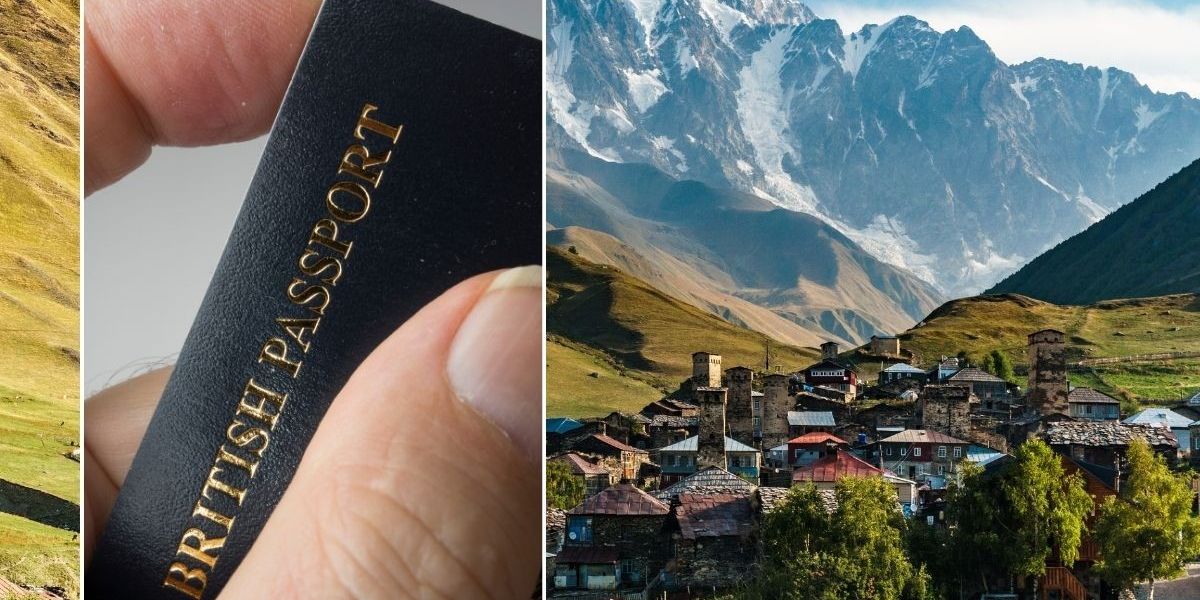
Choosing to move abroad is a major life decision that calls for careful deliberation and planning. Thankfully, relocation experts can provide valuable insight.
Brittany, from She Run the World travel blog, recently recommended one location as particularly accessible for UK nationals looking to start fresh overseas.
She highlighted the benefits of moving to Georgia based on its straightforward long-term visa arrangements for British citizens.
“Georgia is where UK citizens can stay for up to one year without a visa, which is the same as American citizens,” Brittany shared on YouTube.

Georgia has become a popular destination for expats
GETTY
The country sits at a unique crossroads where Eastern Europe meets Western Asia, creating a distinctive cultural landscape.
“It’s kind of on the intersection between Eastern Europe and Western Asia collide so it’s not really considered one or the other,” Brittany pointed out.
“It’s very similar to Turkey in the sense that it’s where European and Middle Eastern cultures, architectures and foods really come together to create a melting pot,”
According to the traveller, the country’s appeal lies in a combination of accessible residency options and lifestyle benefits.
The capital city, Tbilisi, has long been one of the primary destinations for foreign nationals relocating to Georgia, attracting expats with its modern amenities and dynamic nightlife scene.
Professional opportunities are equally abundant in Tbilisi. This makes it an attractive option for career-focused expatriates.
The country’s affordability is another major draw because it offers British expats the chance to live economically while exploring both Eastern Europe and the Middle East.
“It’s super affordable, so it’s a great place to save money and live for cheap while also travelling around the Middle East and Eastern Europe,” explained Brittany.
The relocation expert also highlighted Gibraltar as a particularly appealing option for British citizens, with the right to live and work there indefinitely.
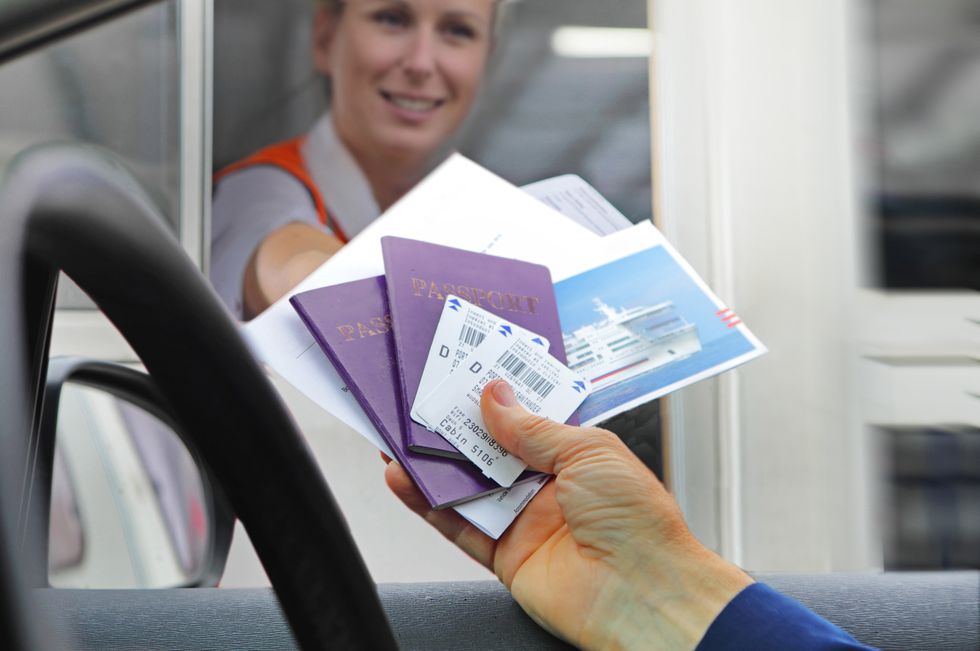
Britons can enjoy lower living costs in Georgia
GETTY
Located at the southern tip of Spain, facing Morocco, Gibraltar maintains a unique status as a British overseas territory.
“It’s technically considered a British overseas territory and not a part of Spain, which is why British people can live there indefinitely,” explained Brittany.
The territory’s position provides residents with easy access to both mainland Spain and North Africa.
British nationals can choose to work, study, or settle in Gibraltar without the visa restrictions typically associated with moving abroad, noted Brittany.
Travel
Review: Weinhaus Tyrol, Innsbruck, Tyrol, Austria
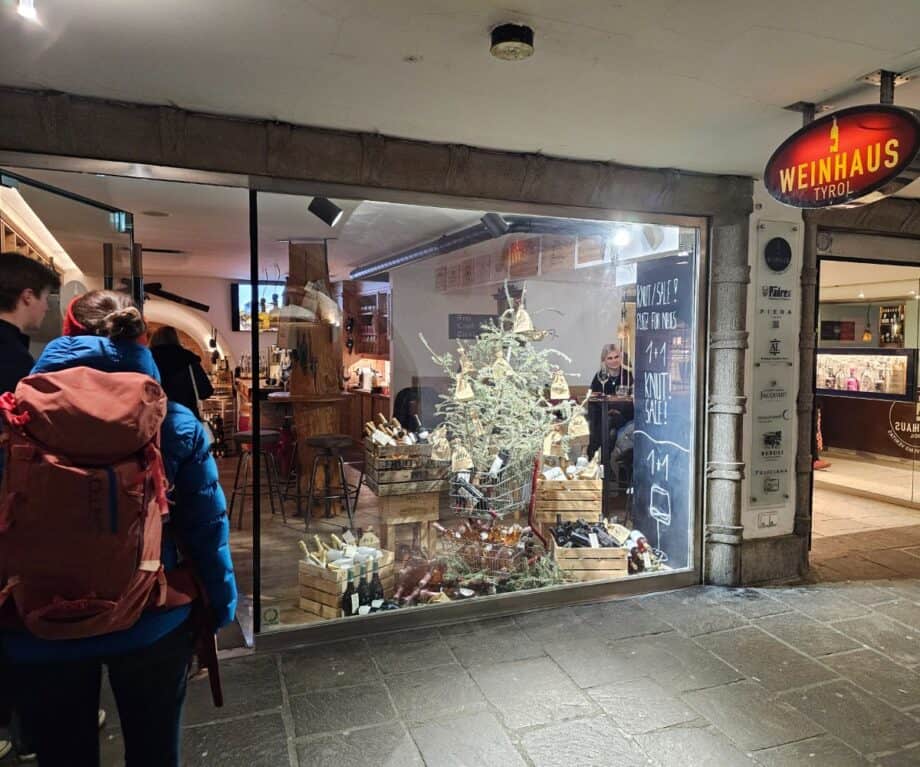
Hidden in plain sight in Innsbruck, Weinhaus Tyrol is known to locals but still flying under the radar of most tourists. It’s the kind of place you dream of stumbling upon, and offers an intimate private dining and wine tasting experience.

Inside, there’s an extensive display of wines, a bar and occasional barrels used as make-shift tables to enjoy a drink or two.
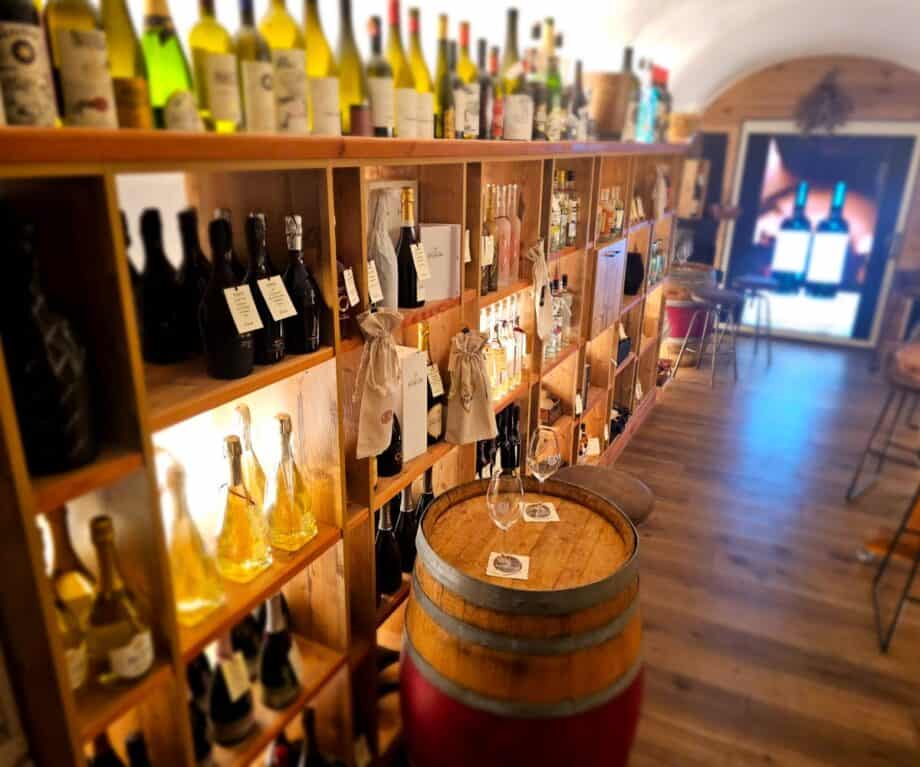
At the end of this corridor and down a few steps, is a small converted cellar. With its arched ceiling, stone walls half-clad in plaster and dimly-lit ambience, it exudes a rustic charm and enjoys various quaint details.

Now I don’t profess to be a wine connoisseur, but I do enjoy a glass or two, and here we were in for a treat – this wasn’t just a dinner and a few glasses of wine, but an invitation to slow down, savour and be immersed into the culinary soul of Tyrol.
A member of staff introduces our first wine to us – it’s the Schmidl Grüner Veltliner Steinfeder Ried Alte Point. The Schmidl winery is a traditional family-run estate in the Wachau, known for its respectful approach to nature and its pursuit of the highest quality. The family cultivates their vineyards in a natural way and relies on sustainable farming methods to reflect the unique terroir of the Wachau. It’s light and fresh with notes of green apple, citrus fruits, and a hint of white pepper.

A generous spread of local cheeses, a selection of perfectly cured meats and a basket of bread are brought through for us to enjoy our wines with, arranged with a rustic elegance that spoke of tradition rather than showmanship, but was nevertheless delicious.

Next up is the Müller Thurgau (a cross between Riesling and Madeleine Royale) from Weinhof Tangl, one of only 13 official wineries in Tyrol. It’s fruity and aromatic with aromas of nutmeg, pear and fresh herbs. The climate in Tyrol differs significantly from that of its southern neighbour. Despite having the same amount of sunshine hours as many cities in South Tyrol, the region experiences more frost nights, which greatly influence grape ripening and wine structure. Weinhof Tangl has been passionately run by the family for generations and their focus is on a harmonious blend of tradition and innovation.

Our third white wine of the evening is another from the Schmidl winery – a Schmidl Riesling Smaragd Küss den Pfennig. Powerful and complex, it has aromas of ripe peach, apricot and a fine minerality. The Schmidl winery is renowned for its excellent Rieslings, which reflect the unique terroir of the Wachau. The name “Küss den Pfennig” (“Kiss the Penny”) refers to a centuries-old tradition and the great value the family places on every detail of wine production.

At this point, the cheese platter – adorned with grapes, figs and wlanuts – offers a welcome balance, helping to complement the wine and absorb some of the alcohol. Tyrol is renowned for its exceptional dairy products, particularly cheeses like Tiroler Bergkäse. The superior quality is largely due to the cows grazing on the pristine mountain pastures, which enhance the flavour of the milk.

Our next wine hails from the only winery located in a European capital city — the Edelmose winery in Vienna which has a history of over 600 years. Since the Middle Ages, winemaking has been pursued there with great dedication, with historic vineyards situated on the foothills of the Vienna Woods. The unique location in the heart of a vibrant city creates an unmistakable terroir and makes Edelmose a true institution in Viennese winemaking. The Edelmoser Rosé de Vienne is made from Zweigelt and Pinot Noir grapes – it’s fresh and fruity with aromas of red berries, cherry and a hint of floral notes.

And then it’s on to our first red of the evening with the Ernst Zweigelt Deutschkreuz (Zweigelt is an Austrian cross between Blaufränkisch and St. Laurent, known for its fruit-driven and spicy red wines with soft tannins). The Ernst winery is located in Deutschkreuz, the heart of Blaufränkisch country in Burgenland, and is known for its characterful red wines. The Ernst family focuses on natural cultivation, sustainable wine production, and authentic wines that perfectly reflect the region’s terroir. The Seewinkel region is characterized by unique geological and climatic conditions that are of great importance for viticulture. The seasonal drying of the saline lakes creates specific soil conditions that impart a mineral and salty note to the wines. It’s bold and spicy with notes of dark cherries, berries and a subtle touch of vanilla.

It seems there’s another wine waiting for us, but by now, we’ve had our fill. Each wine had been exquisite but what made the experience truly special was the ambience and sense of exclusivity, and – of course – good company. For anyone visiting Innsbruck, Weinhaus Tyrol is an absolute must-visit.
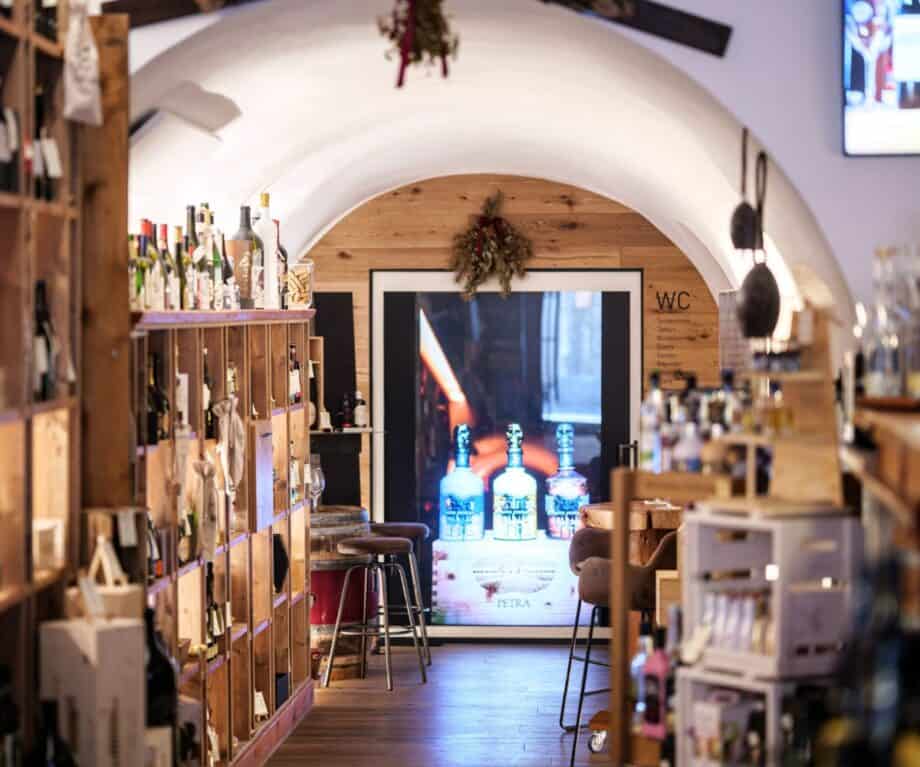
Disclosure: Our trip was sponsored by Innsbruck Tourism.
Did you enjoy this article?
Receive similar content direct to your inbox.
Travel
St. Regis Longboat Key review
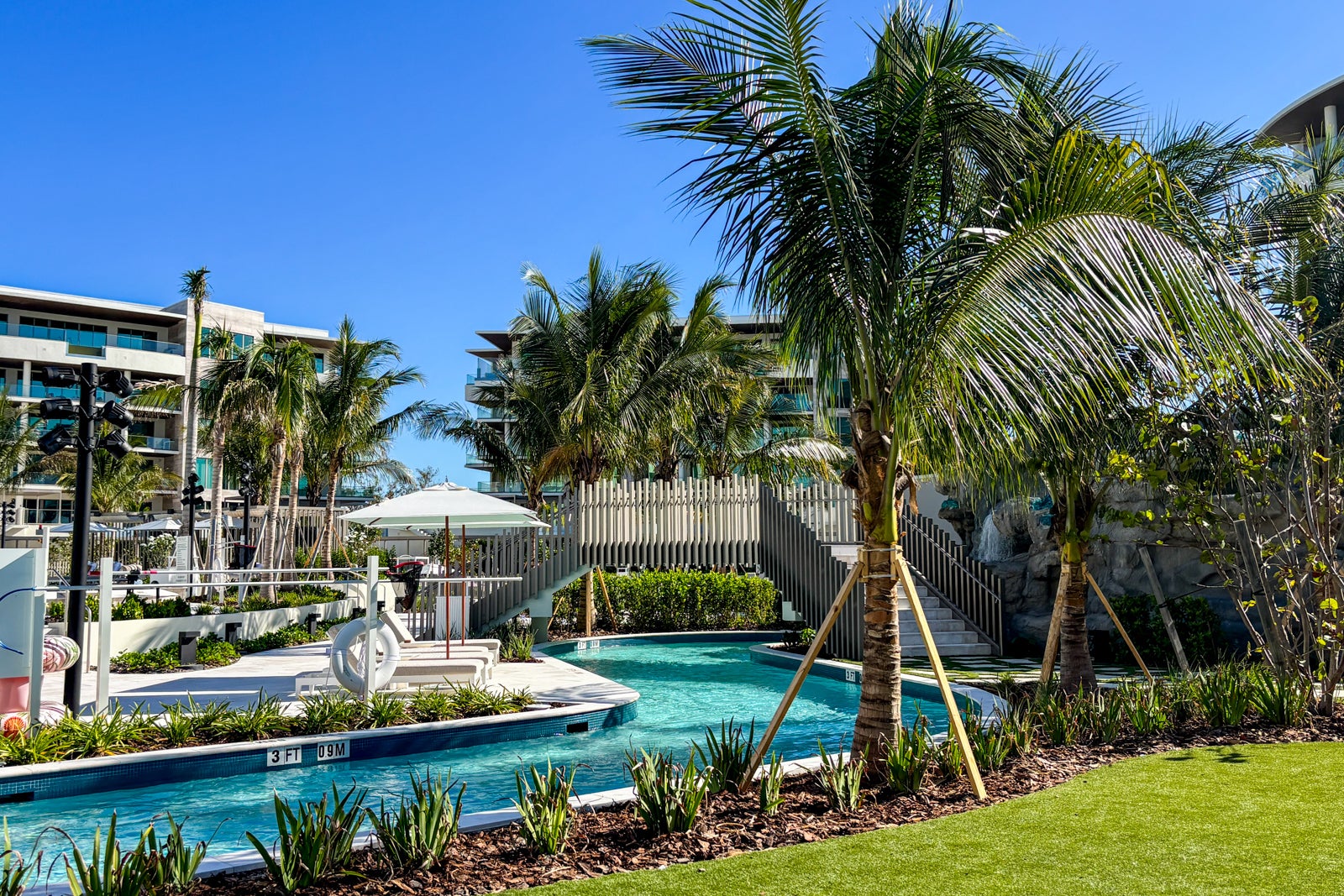
I may be biased, but as a born-and-raised Floridian, I can confidently say the Sunshine State is one of the best places to vacation in the United States. The draw of Southwest Florida has always been undeniable: serene beaches, picturesque sunsets and tropical weather nearly all year-round, with less-crowded beaches than what you might see in other Florida vacation spots like Daytona or Miami.
And now, nestled along Florida’s pristine Gulf Coast, comes Marriott’s newest Florida resort, the St. Regis Longboat Key. With impeccable service and luxury accommodations, the property takes everything there is to love about a Florida vacation and elevates it.
While the price for a stay here can be quite steep, this hotel can certainly be more attainable if you’re willing to save up your Marriott Bonvoy points. Here’s what it’s like to stay at the St. Regis Longboat Key — and why it earned a spot on our list of the best new hotels in 2024.
Related: The best St. Regis hotels for the most luxurious hotel stays
What is the St. Regis Longboat Key?
Celebrated as the most significant development in the region in more than 50 years, the St. Regis Longboat Key was one of the most anticipated hotel openings in 2024. It also marks a major milestone for Marriott — its 9,000th property.
The resort features 168 rooms and suites, a 20,000-square-foot spa, a beachfront lazy river and a 350,000-gallon lagoon filled with 2,800 tropical fish — all spread across 18 acres of prime beachfront real estate.
The hotel’s design is rich with tributes to Florida’s natural elements and wildlife, as well as the legacy of circus magnate John Ringling and the Ringing Brothers, including contemporary nods like elegant rope-clad chandeliers and an oval-shaped ballroom that resembles a circus tent. Even the suites continue the long-held St. Regis tradition of being named to honor prominent women who have called the surrounding area home, including Mable Ringling and Lora Whitney.
True to St. Regis form, the hotel is equipped with an extensive array of top-notch amenities and its signature butler service.

Daily Newsletter
Reward your inbox with the TPG Daily newsletter
Join over 700,000 readers for breaking news, in-depth guides and exclusive deals from TPG’s experts
How to book the St. Regis Longboat Key
The St. Regis Longboat Key offers nine different room and suite types. Rates for superior rooms, which average around 470 square feet and have partial water views, start at roughly $930, or 102,000 Marriott points, per night during peak months. Deluxe and grand deluxe rooms, on the other hand, have ocean views and encompass around 545 square feet. Deluxe rooms start at roughly $1,014, or 124,000 Marriott points, and grand deluxe accommodations begin at $1,161 or 154,000 Marriott points.
Then there are the 26 oceanfront suites that range from one- to four-bedroom options, all boasting what I can confirm are absolutely breathtaking views of the Gulf of Mexico that you can enjoy from your private terrace. When checking various dates throughout the calendar, suite availability for point redemption can vary depending on the season, but expect them to have starting costs of around 400,000 Marriott points or $4,000 per night for a one-bedroom suite.
When booking the St. Regis Longboat Key, you’ll want to use one of the credit cards that earn the most points for Marriott stays, and one that offers automatic Marriott Bonvoy elite status for value-added benefits. These include:
- Marriott Bonvoy Brilliant® American Express® Card: Earn 6 points per dollar spent on eligible purchases at hotels participating in the Marriott Bonvoy program; automatic Platinum Elite status; and 25 elite night credits per year toward a higher tier.
- Marriott Bonvoy Bevy™ American Express® Card: Earn 6 points per dollar spent on eligible purchases at hotels participating in the Marriott Bonvoy program; automatic Gold Elite status; and 15 elite night credits per year toward a higher tier.
- Marriott Bonvoy Bountiful™ Card: Earn 6 points per dollar spent on eligible purchases at hotels participating in the Marriott Bonvoy program; automatic Gold Elite status; and 15 elite night credits per year toward a higher tier.
- Marriott Bonvoy Business® American Express® Card: Earn 6 points per dollar spent on eligible purchases at hotels participating in the Marriott Bonvoy program; automatic Gold Elite status; and 15 elite night credits per year toward a higher tier.
- Marriott Bonvoy Boundless® Credit Card: Earn 6 points per dollar spent on eligible purchases at hotels participating in the Marriott Bonvoy program; automatic Silver Elite status; and 15 elite night credits per year toward a higher tier.
- Marriott Bonvoy Bold® Credit Card: Earn 3 points per dollar spent on eligible purchases at hotels participating in the Marriott Bonvoy program; automatic Silver Elite status; and 5 elite night credits per year toward a higher tier.
The information for the Marriott Bonvoy Bountiful card has been collected independently by The Points Guy. The card details on this page have not been reviewed or provided by the card issuer.
The location
As soon as we approached the St. Regis, it felt like we’d entered an exclusive island getaway; it is one of the few hotels you’ll find on Sarasota’s barrier islands. There were staff outside, ready to greet us by name (with warm towels and Champagne, might I add) as soon we pulled up to the valet. Once we passed through the oversized lobby doors, we were immediately welcomed by a sparkling mosaic St. Regis logo on the floor. When we looked up, our gaze went straight to the grandiose floor-to-ceiling windows that look out onto the Gulf of Mexico.
1 of 3
LAUREN WASSUM/THE POINTS GUY
If you’re traveling to the St. Regis by air, Sarasota Bradenton International Airport (SRQ) is the nearest airport. Airport transfers are not available, but the resort is just a 20-minute drive away and costs around $30 to $50 via taxi or ride-hailing service.
For a wider selection of flights, you might prefer landing at Tampa International Airport (TPA). However, the drive will take about an hour and a half, and you can expect to pay around $200 for a taxi or ride-hailing service, so you may want to rent a car instead. Valet parking at the St. Regis is $55 daily, with electric car charging stations available.
Besides soaking up the sun at one of St. Regis’s multiple pools or its private beach, guests can take a short eight-minute drive to St. Armand’s Circle, a bustling outdoor shopping and dining district that is well on its way to recovery following Hurricane Helene.
The resort is also just a bridge away from downtown Sarasota. You can venture downtown for various dining and nightlife options in a laid-back, beachy atmosphere. I highly recommend visiting the nearby Ringling Museum, which provides an enriching cultural excursion, showcasing diverse art collections and beautifully manicured gardens. With its pink-walled exterior and Italian-style design, the museum looks like a literal palace from the Renaissance period — and is also the perfect place to capture an Instagram picture of your travels.
The museum has 21 galleries, so plan to spend a few hours wandering through the different exhibits. You’ll be glad you did.
Rooms at the St. Regis Longboat Key
After check-in, I was escorted by our butler, Jennifer, up to the third floor to our suite, which was furnished and designed with neutral hues, like grays and creams, as well as organic textures that felt cohesive with the resort’s contemporary coastal aesthetic.
1 of 5
LAUREN WASSUM/THE POINTS GUY
An oval marble dining table with a sweet welcome treat was waiting for me: a chocolate turtle placed in a pool float with a pink signature pattern designed just for the St. Regis Longboat Key.
Beyond that is a generously sized living area with a large flat-screen TV and ample seating. And like the rest of the resort, the room’s true standout feature has to be the floor-to-ceiling windows that frame the terrace, offering breathtaking ocean views.
Before entering the bedroom, you walk through the hallway closet with several amenities, including the St. Regis’s signature robes and slippers, a safe, an iron and even a specialty laundry bag just for your swimsuit. The staff also noticed my husband and I had glasses, so they added some St. Regis-branded glasses cleaner on one of our closet shelves later that day.
The bathroom was like a tranquil spa retreat in itself.
1 of 5
LAUREN WASSUM/THE POINTS GUY
On one side, a discreet wash closet housed the toilet, while the other held a rainfall shower equipped with a handheld shower wand. Adjacent to the dual-vanity sink on the left was a deep soaking tub that invited relaxation.
Great food and even better service
There is plenty to choose from when it comes to eateries and bars at the St. Regis Longboat Key. The resort’s seven dining venues are diverse and vibrant, with each one offering a unique culinary experience. From an indoor steakhouse with a hidden speakeasy to a rooftop Japanese-fusion lounge overlooking the Gulf of Mexico, each dining option offered its own unique experience, complete with curated decor, making it a memorable and can’t-miss part of the guest experience.
Riva
1 of 3
LAUREN WASSUM/THE POINTS GUY
Named after the Italian word for “shore,” Riva is the premier Italian restaurant on the property and serves breakfast, lunch and dinner. The menu combines imported Italian specialties and local ingredients, from olives and prosciutto to fresh burrata and daily catches, ensuring authentic flavors.
Our first meal here was at lunch, where we tried the whipped ricotta ($8) and lemony borlotti (cranberry bean) hummus ($8) appetizers, both served with freshly made focaccia.
We enjoyed our lunch so much the first day that we also chose to have both breakfast meals at Riva. I had the sfoglina breakfast ($24), which comes with two eggs any style, hash browns, choice of meat, roasted tomato and toast. I’m a creature of habit when it comes to my coffee, and I ordered an iced vanilla latte ($8) each morning, which was delicious each time. The next time we ate here, I craved something more indulgent, so I opted for the Riva waffle ($19), topped with Nutella, caramelized bananas and blueberries.
Aura
1 of 3
LAUREN WASSUM/THE POINTS GUY
For poolside or in-restaurant dining and tropical cocktails, Aura is the place to be. While we didn’t have time for an entire meal here, some of the favorites among staff are the beef barbacoa tacos ($24) and the grouper ($26) served with mojito tartar, marinated tomatoes, lettuce and fennel and apple salad.
However, we did enjoy the guacamole ($15) poolside, which was not too dense and not too creamy but packed with flavor. I also loved that it didn’t just come with tortilla chips but crispy plantains and cassava chips as well. I could have gone for several rounds of this!
CW Prime
The crown jewel of dining at the St. Regis, CW Prime, blew me away from the moment we arrived.
1 of 4
LAUREN WASSUM/THE POINTS GUY
Before dinner, we spent a little time in the small speakeasy known as the Spirit Room. Here, there’s a discreet button that reveals an exclusive cocktail unique to that venue. Think before you push, though, as the exclusive secret cocktail, the Caroline 400, runs $400 a glass. And no, that isn’t a typo.
After drinks, we were seated in the main dining room for what would be a meal to remember.
1 of 6
LAUREN WASSUM/THE POINTS GUY
We started with crispy potato pave ($22), which features warm, crispy layers of potato with truffle aioli, pickled pearl onions and fresh truffle. We also had the crispy, fresh CW Caesar ($21) that was easily big enough to split — it can be plated separately to make sharing easier.
Our amazing server, Topher, didn’t just go over the menu but explained the concepts behind different dishes and what makes them great. I wholeheartedly think that the storytelling made each dish taste even better.
For our entrees, steak dishes were the obvious choice, seeing that they are cooked on a Josper grill. We got the 14-ounce dry-aged prime strip loin ($85), and it was cooked to absolute perfection. Expectations were high, and it was juicy and full of flavor.
Then there was the CW Prime Burger ($50), which I can confidently say was one of the best burgers I have ever tasted. It was topped with wagyu beef bacon, tomato preserve, shallot jam and aged cheddar, all between a house-made cronut bun. I still think about that burger to this day.
Oshen
1 of 2
LAUREN WASSUM/THE POINTS GUY
I couldn’t decide what I loved more about this rooftop lounge: the views or the burst of flavor from each course. I especially liked the mixed seafood ceviche ($25) and selection of sushi ($24-$28 per roll). Thanks to simple preparations and fresh ingredients, each dish tasted ultrafresh and flavorful.
Here, you’ll also find a talented cast of mixologists who serve up some delicious fusion-inspired cocktails and zero-proof drinks all night long. While every single cocktail I tried impressed me, the Edo Old-Fashioned made with Mars Shinshu Iwai whisky, five-spice bitters and Okinawan brown sugar syrup ($23) was definitely my favorite.
The St. Regis Bar
1 of 2
LAUREN WASSUM/THE POINTS GUY
Located in the heart of the lobby is the St. Regis Bar, which itself is an art piece with a soft pink and gold hand-painted mural that stretches around the bar and cascades onto the ceiling. A glass of Moet & Chandon Champagne is $35, which gives guests just a taste (literally) of the luxury that’s to come.
Every night at sunset, the St. Regis Bar holds their evening ritual: a Champagne sabering. The tradition at St. Regis dates back to 1904 when John Jacob Astor IV inaugurated the New York City St. Regis by ceremoniously sabering a bottle of Champagne. Nowadays, this custom is celebrated nightly at St. Regis properties around the world, and Longboat Key is no different. And sometimes, they even let guests saber the bottle, including yours truly — with supervision, of course.
Monkey Bar
1 of 2
LAUREN WASSUM/THE POINTS GUY
The local favorite beachfront Monkey Bar, instrumental to the legacy of The Colony Hotel, where the St. Regis now stands, has been revitalized. Accessible to both St. Regis guests and locals through a beachside entrance, the bar offers a contemporary take on tiki cocktails while also providing an array of light snacks. Among them is the Murf and Surf Dog ($34), a tribute to The Colony’s Murf Klauber and the renowned Murf Dog. This updated version of the classic hot dog is decadently garnished with a luxury twist: generous chunks of lobster.
An array of pools, private cabanas and a winding river await
Located in the resort’s central courtyard is an area aptly named “The Pools.”
1 of 6
LAUREN WASSUM/THE POINTS GUY
The main Resort Pool is family-friendly, surrounded by luxury loungers and has a large jacuzzi with plenty of space for multiple people.
The adults-only Serenity Pool is further away and located a few steps away from Monkey Bar and Aura. It has a cascading waterfall and is a perfect retreat for those seeking a quieter escape.
You can also choose to spend the day at the resort’s private beach, where guests can use two luxury loungers included as part of your daily resort fee. The best part? You can still expect the same high level of service you would get at the pools.
1 of 4
LAUREN WASSUM/THE POINTS GUY
There’s also the property’s lazy river, or as the St. Regis prefers to call it, the winding river. I was able to grab one of the single inner tubes (double tubes are also available) branded with the resort’s signature print and float along.
Although it was not accessible during my stay, there is a cavern tucked beneath the waterfall of the winding river, where Champagne can be summoned with the press of a button.
1 of 7
LAUREN WASSUM/THE POINTS GUY
Private cabanas also dot the area, with reservation prices ranging from $250 to $550 daily. After browsing online, however, I found that during peak holiday times like Christmas week, prices can spike from $800 to $1,000 for the day.
When we arrived at the pools, our butler, Jennifer, escorted us to our cabana, nestled in the middle of the winding river on the turfed Mangrove Island. It offered comfortable seating that could easily fit up to eight people, a flat-screen TV, bottled water and plenty of towels. There was also a safe and a small refrigerator filled with sodas and nonalcoholic drinks. You also get a dedicated pool butler for the day, a first-of-its-kind offering for the St. Regis resort brand.
1 of 2
LAUREN WASSUM/THE POINTS GUY
A poolside menu for Aura was also in our cabana. It’s also just a few steps away from the pools if you prefer to sit inside the restaurant for lunch. We ordered the chips and guacamole, which was the perfect appetizer to enjoy while lounging in the Florida sun.
1 of 3
LAUREN WASSUM/THE POINTS GUY
Whether you opt for a lounge chair or rent a private cabana, getting top-notch service is as easy as pushing a button. Each chair has a small St.Regis-branded wood box with two buttons inside, one to call for food and beverage and the other for concierge services.
Relax at the St. Regis Spa
The St. Regis Spa spans an impressive 20,000 square feet, presenting guests with an experience that begins at their unique Celebration Bar. Upon approval, I was welcomed with a complimentary glass of Champagne, setting the tone for what would come.
The spa is a haven of tranquility, offering a broad spectrum of nature-inspired treatments with avant-garde skincare technology. The spa also has an exclusive partnership with La Mer and is one of the only two spas in the country to do so.
Prior to my treatment, I visited the hydrothermal area, which is available to anyone with a treatment booked, to loosen my muscles. It has plenty of amenities, including a Finnish sauna, a eucalyptus steam room that cleanses your senses, a shockingly delightful snow shower, vitality waters, cold plunges and sensorial showers.
1 of 4
LAUREN WASSUM/THE POINTS GUY
I was then brought back to the treatment room to receive a wonderful 60-minute relaxation massage ($235) followed by the Soothing by La Mer facial ($275). I got to pick from a selection of scents to enhance my massage experience, and my slippers were placed in a warmer, which was a pleasant and much-welcomed surprise.
For those inclined toward a more active form of relaxation, the state-of-the-art fitness center is outfitted with cutting-edge Technogym equipment, catering to all levels of fitness enthusiasts.
Swim with marine life in the private saltwater lagoon
One of the most unique experiences the St. Regis Longboat Key offers is its 350,000-gallon saltwater lagoon, home to almost 50 stingrays and more than 40 species of 2,800 tropical fish.
If you truly want to immerse yourself in the Florida wildlife, I highly recommend the Under the Water lagoon experience, where you can snorkel with tropical fish and feed the smaller stingrays (don’t worry — the stingrays’ barbs are removed).
1 of 4
LAUREN WASSUM/THE POINTS GUY
We had two expert guides for our hourlong lagoon experience. After signing a waiver and a brief orientation, they gave us wet vests and socks to protect our feet from the rocky bottom. We started with feeding and gently petting the small cownose stingrays. While I was a little nervous at first to do so, our guides made me feel much more comfortable.
Next, we put on our snorkeling gear and swam through the lagoon on the water’s surface. Our guides pointed out different fish and told us interesting facts along the way. Once we reached the other side, we could sit down in shallow water and gently pet the larger southern stingray species.
The lagoon experience costs $125 per person and is ideal for swimmers of all skill levels. However, you must be 8 and older to participate in the full snorkel experience: 8- to 13-year-olds must be with a guardian and 14- and 15-year-olds must have a guardian’s signature. Children under 8 cannot swim in the lagoon but can participate in the stingray portion of the snorkel experience.
Accessibility
Since this is a new build, I had high expectations for accessibility features. The resort only has valet parking, but there is plenty of room for transfers, and the entrance is completely accessible.
Public areas feature wide spaces, allowing unobstructed navigation and spacious elevators for easy entry and exit. The restaurants, spa and fitness center also all have accessible entrances that are either located directly on the first floor or easily accessible by ramp or elevator.
Since the pools are a central focus of the resort, I was pleased to see that each pool and the winding river are equipped with a pool lift transfer system.
Wheelchair-accessible guest rooms ensure plenty of space, with doorways wide enough to accommodate standard-size wheelchairs and furniture thoughtfully arranged to prevent unnecessary obstructions. These rooms feature roll-in showers with grab bars, adjustable showerheads and lowered fixtures and amenities like sinks and closet rods.
Checking out
Based on my experience, I felt like the St. Regis Longboat Key provided everything one could want from a Florida vacation, offering a balanced blend of entertainment and relaxation. The resort’s tailored amenities, like the world-class spa and adults-only serenity pool, offer privacy and tranquility, while the array of pools, the winding river and the saltwater lagoon ensure that guests of all ages find enjoyment and adventure. This splashy new property easily adds to the many reasons why Florida’s Gulf Coast barrier islands should be on your travel list.
Related reading:
Travel
‘F*** off you little rats!’
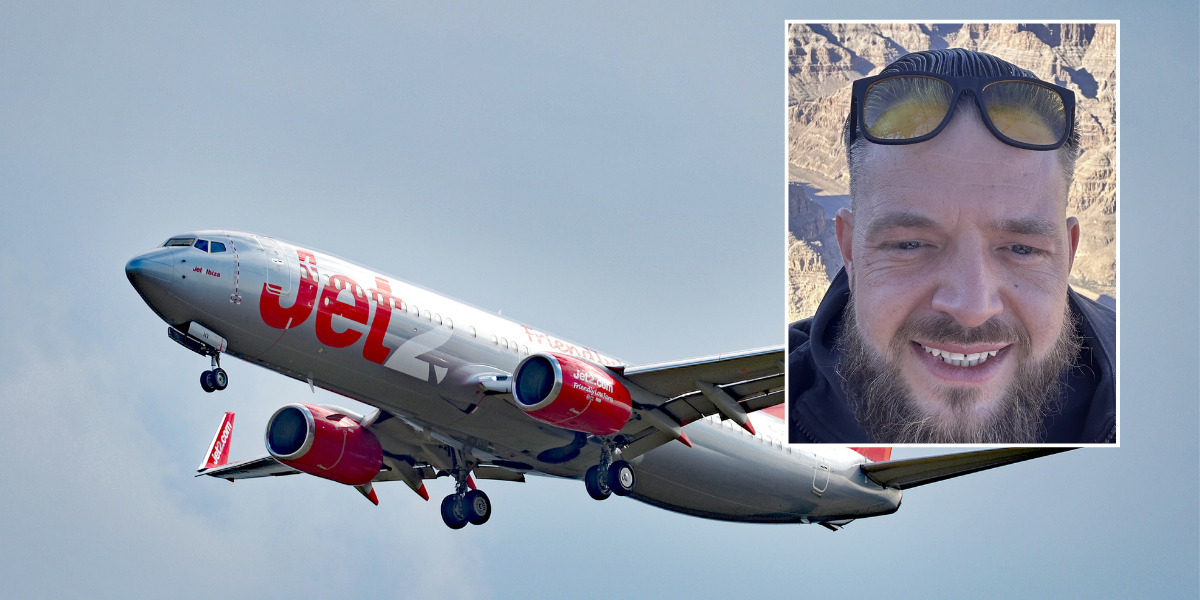
A father was dragged off a Jet2 flight at Manchester Airport after launching into a drunken tirade, shouting “f*** off you little rats” at police officers who removed him from the aircraft.
Lewis Howarth became aggressive when police attempted to escort him from the Turkey-bound plane, which had to return to Terminal 1 during taxiing.
As officers removed him, hundreds of passengers clapped and cheered while filming on their mobile phones.
When told he wouldn’t be going on holiday, Howarth responded with a stream of expletives, calling officers “f******d***heads” and “rat b******s.”

Lewis Howarth of Bolton became aggressive
PA/Facebook
The incident, which occurred yesterday, led to Howarth’s arrest and subsequent court appearance at Manchester Crown Court.
Howarth had been abusive to cabin crew throughout the safety briefing, repeatedly standing up when instructed to remain seated. When asked to fasten his seatbelt, he called a stewardess a “d***head,” the court heard.
Prosecutor Saul Brody told Manchester Crown Court that the cabin crew described Howarth as “highly intoxicated” and reported him swearing at other passengers.
Initially appearing compliant when police boarded, his behaviour quickly deteriorated as they approached the exit.
LATEST DEVELOPMENTS:
 Manchester Crown CourtPA
Manchester Crown CourtPA“He started to resist and tried to fight or assault those escorting him,” said Brody. “He was taken to the floor and handcuffed, and was described as thrashing his head towards the passengers and officers.”
When being escorted from the aircraft, Howarth attempted to bite one officer and kicked out at another as staff brought a wheelchair to remove him.
Upon arrest, he admitted to drinking half a bottle of whisky before boarding the flight. When an officer confronted him about his behaviour, saying “there were so many kids on there,” Howarth replied: “My kids are there… you are f*****g wrong.”
The court heard that Howarth had previous convictions for being drunk and disorderly, affray, racially aggravated harassment, assaulting a police officer and failing to comply with court orders. The incident was captured on police bodycam footage, which was later shown to Howarth.
His defence lawyer, William Staunton, told the court Howarth had been “peer pressured” into drinking by a friend due to nervousness about flying. Staunton said his client was “profoundly ashamed and deeply remorseful,” noting that Howarth part-owned a building company and had appeared on TV for DIY emergencies.
However, Recorder Geoffrey Wells dismissed the peer pressure defence as “nonsense” during sentencing.
“This behaviour was shocking. There is no excuse for being drunk when you go on an airplane. Your children saw you behaving like that. What kind of example is that? Wholly disgraceful,” the judge said.
Howarth, of Mobberley Road, Bolton, was sentenced to 14 weeks in prison, of which he will serve half before release on licence.
Travel
Motorway chaos sees drivers stuck in hours-long delays as Storm Eowyn batters UK

Drivers are being warned of long traffic delays across major motorways around the UK as the country is battered by Storm Eowyn.
The Met Office has issued several yellow, amber and rare red warnings as Storm Eowyn brings winds of more than 100mph and torrential rain.
At present, the M25 in Kent is closed anti-clockwise between J3 (M20 J1/Swanley) and J2 (Dartford) following a collision.
While lane one remains open, lanes two, three and four remain closed, with National Highways: South-East calling on drivers to allow extra time for their journey.
Do you have a story you’d like to share? Get in touch by emailingmotoring@gbnews.uk

Drivers are being urged to consider whether they need to travel during the dangerous conditions
NATIONAL HIGHWAYS
It follows an accident on the clockwise section of the M25 on Thursday, which claimed the life of a 53-year-old man in a single-vehicle crash.
Thames Valley Police reported that a blue Ford Kuga crashed between Junction 15 for the M4, near Slough, and Junction 16 for the M40, near Denham, Buckinghamshire.
The driver died at the scene and no other passengers or vehicles were impacted by the accidents. TVP said it was supporting the man’s next of kin.
Storm Eowyn has prompted the closure of the Severn Bridge for several hours, with National Highways: South-West monitoring wind speeds at the Severn Crossing with the M48.

The Met Office has issued several red weather warnings
PA
Drivers along the M1 northbound are waiting in hour-long delays as traffic officers continue to work on emergency carriageway repairs.
The lane closure between J28 and J29 near Mansfield has been in place since late last night, with three of four lanes closed at present.
Lane one of the section remains closed for the ongoing long-term roadworks, with lane four open to traffic. Drivers are again being asked to allow extra time for their journeys.
The M62 Ouse Bridge (between J36 and J37) is closed to high-sided and vulnerable vehicles due to strong winds.

National Highways has provided guidance for motorists who may be impacted by strong winds
NATIONAL HIGHWAYS
National Highways have called on drivers to make themselves aware of the vehicles that are vulnerable during strong winds, including motorhomes, vans, motorcycles and double-decker buses.
Speaking yesterday, Alice Simpson, spokesperson for RAC Breakdown, called on drivers to “avoid the roads” unless it is absolutely necessary.
This followed the Met Office issuing multiple red weather warnings, with Simpson saying they were the “strongest possible signal” that motorists should take care.
She added: “With the worst conditions expected in parts of Scotland and Northern Ireland, we strongly urge motorists in these areas to stay safe by parking away from trees that could be uprooted by 100mph winds.
LATEST DEVELOPMENTS:

Storm Eowyn has been described as ‘the worst storm in a century’
WX charts
“Those in northern England and northwest Wales, where amber warnings apply, should also take great care if setting out.
“It’s best to keep a firm grip on the steering wheel, avoid coastal routes where the strength of the wind will be most severe and watch out for debris.”
Travel
Britons in Tanzania issued travel warning as deadly virus prompts fresh entry requirements

Tanzania has implemented new health measures following an outbreak of Marburg virus disease in the Kagera region, where nine suspected cases have been reported, including eight deaths.
The Government issued a travel advisory on 21 January requiring mandatory temperature checks at all entry points into the country, the Foreign, Commonwealth and Development Office warned.
The outbreak has prompted heightened surveillance measures as health officials work to contain the spread of the virus, which belongs to the same family as Ebola.
Under the new travel advisory, all travellers entering Tanzania must undergo temperature checks at all points of entry.
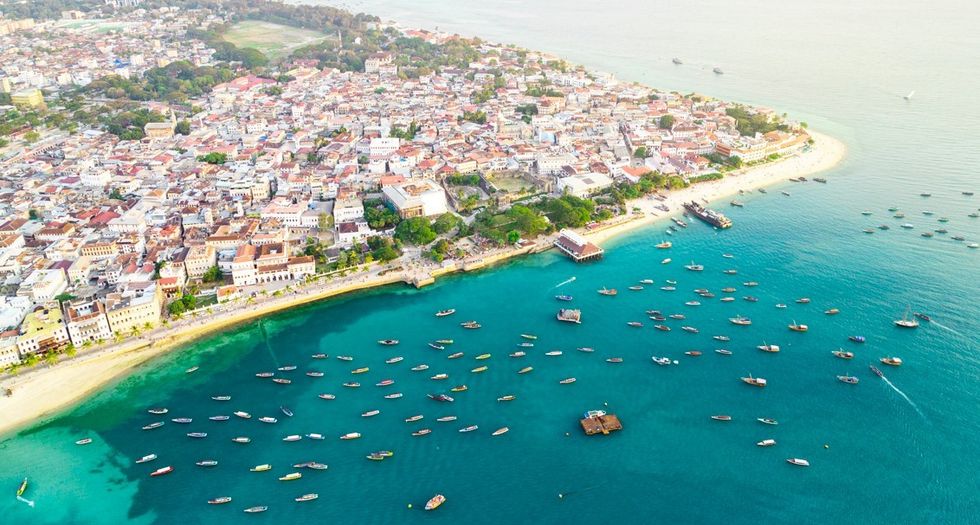
Measures have been introduced to control the spread of the virus
GETTY
Those leaving the Kagera region face additional requirements, including mandatory exit screening and completion of an online form.
The measures are part of Tanzania’s efforts to monitor and control the spread of the virus across its borders.
Visitors to Tanzania should also be prepared to present their return or onward tickets at border control points as part of the enhanced screening process.
The suspected cases were identified across two districts in the Kagera region – Biharamulo and Muleba – as of January 11, 2025.
Health officials officially reported the outbreak on January 13, 2025, with laboratory results still pending confirmation.
The cluster of cases has raised significant concern among health authorities, with eight of the nine suspected cases resulting in fatalities.
The rapid progression of the outbreak has led to the implementation of strict monitoring protocols across the affected districts.
Marburg virus disease poses a severe health risk, with historical fatality rates ranging from 25 per cent to 88 per cent.
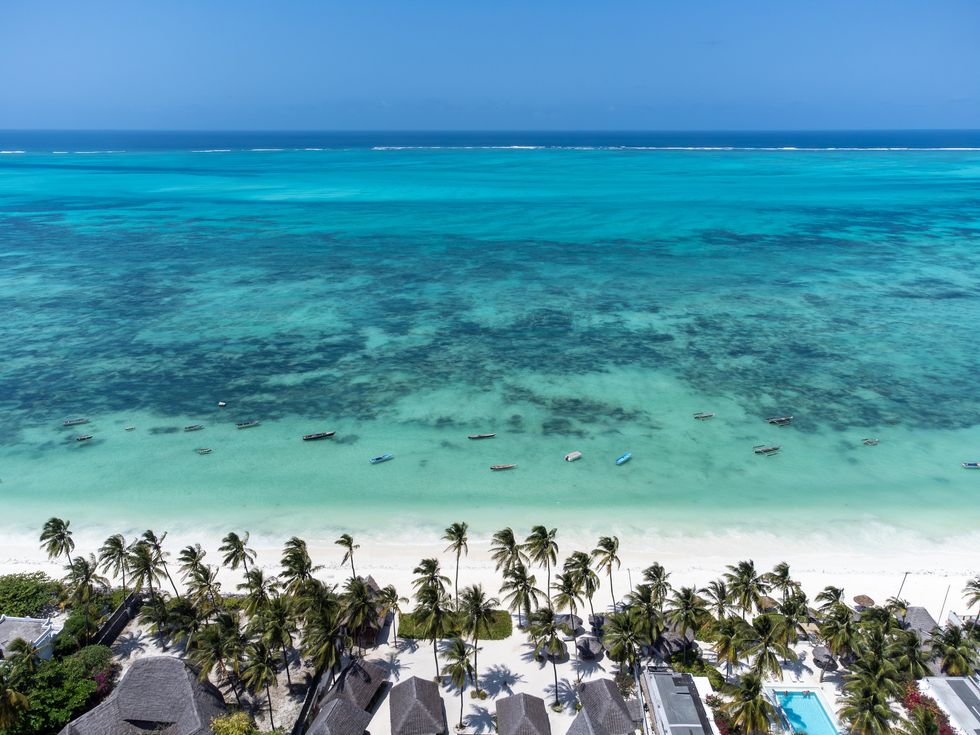
As of January 11, eight deaths were reported in connection to the Marburg virus disease outbreak
GETTY
The virus belongs to the same family as Ebola and can cause severe haemorrhagic fever in infected individuals.
Health officials are particularly concerned about the high mortality rate observed in the current outbreak, with eight deaths among nine suspected cases.
The severity of the disease has prompted Tanzanian authorities to implement comprehensive screening measures whilst awaiting laboratory confirmation of the suspected cases.
Travel
Why you want to book a windowless ‘inside’ cabin on a cruise ship
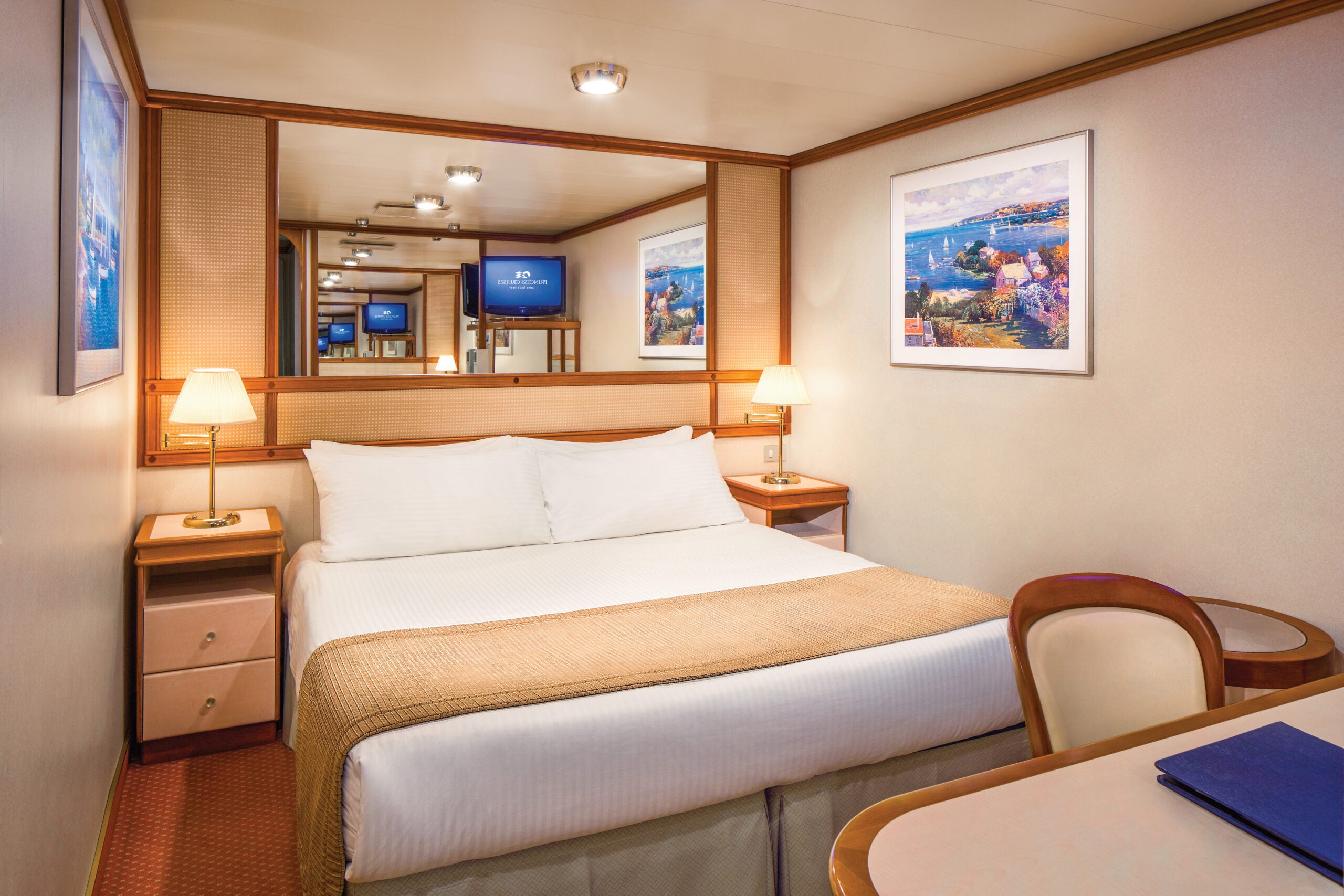
As regular readers know, I’m a big fan of cabins with balconies. As I explained in a recent story, there’s nothing quite like being able to step onto a balcony on a ship to breathe in the fresh ocean air.
But that doesn’t mean I’m opposed to the idea of staying in a cabin without a balcony. In fact, at times, I’ll even book a cabin that doesn’t have a window — or, as they’re known in the cruise world, an “inside” cabin.
If you’ve never been on a cruise before, you might not even know there’s such a thing as a cabin without a window. But there is, and they’re actually quite common. Many ships operated by major lines such as Royal Caribbean and Norwegian Cruise Line have hundreds of windowless cabins.
That may seem almost unthinkable to people who are used to staying at hotels on land. After all, there aren’t a lot of hotels that have hundreds of rooms without windows. If there were, we’re guessing they wouldn’t be huge sellers.
But it’s fair to say that accommodations on cruise ships have their own set of quirks.
The upside of an inside
The lack of a window isn’t the only reason to pooh-pooh the idea of staying in an inside cabin.
In addition to offering nary a peek at the world, inside cabins — named because they’re generally located toward the middle of ships, away from exterior walls — also often are the smallest cabins on any cruise ship. Many are downright tiny. That latter point can be a big turnoff for some cruisers.
But there are advantages to inside cabins, too. For starters, inside cabins often are significantly less expensive than ocean-view cabins. They also offer a sort of “less is more” minimalism that can appeal to a keep-it-simple crowd.
Related: 5 reasons to turn down a cruise ship cabin upgrade

Daily Newsletter
Reward your inbox with the TPG Daily newsletter
Join over 700,000 readers for breaking news, in-depth guides and exclusive deals from TPG’s experts
For me, at least, there are times when a cabin that’s inexpensive and modest in size is just fine, even if it doesn’t have anything in the way of a view.
After all, for the most part, I’m not taking cruises to spend a lot of time in a cabin. Like most cruisers, I get on ships to enjoy all they have to offer in their public spaces and to explore all the wonderful places to which they sail.
In that context, does it really matter if the room where I’ll sleep each night is big and fancy?
Related: The 5 most desirable cabin locations on any cruise ship
To steal a line from Arthur Frommer, the legendary guidebook author and guidebook company founder, “Most of the time you’re in your room on vacation, your eyes are closed.”
Frommer said that to me years ago during an interview about his favorite hotel rooms. He thought spending huge sums on fancy digs was a waste. His words stuck with me over the years, and now I see their wisdom.
Here are six reasons you might want to seriously consider the least expensive inside cabins on any cruise ship.
You’ll save money
This is, for sure, the big allure of inside cabins. They can be an incredible deal.
At the time of this story’s publishing, fares for inside cabins on six-day Royal Caribbean cruises out of Fort Lauderdale in January 2026, for instance, were available for about 20% less than fares for balcony cabins. The fares for inside cabins were less than half the cost of the least expensive suite.
Specifically, you could get on the line’s amenity-packed Allure of the Seas out of Fort Lauderdale on a Jan. 11, 2026, departure for $760 per person, if you were willing to stay in an inside cabin. That works out to just $109 a day.
Related: Royal Caribbean cruise ship cabin and suite guide: Everything you want to know
The thing to remember here is that all of Allure of the Seas’ major attractions, from deck-top pools and surfing simulators to an indoor ice skating rink and a giant theater with Broadway-style shows, are open to everyone on board, whether they’re staying in the smallest or biggest cabin. So are nearly all the ship’s onboard restaurants, bars and lounges.
Other than having to sleep in a smaller, windowless room, you’ll be getting much of the same onboard experience as someone who pays far more for a snazzy cabin but at a fraction of the price.
You’ll sleep like a baby
There is no dark in the world like the dark of an inside cabin. Once you turn off the lights, it will be pitch black — the kind of darkness that’s almost scary to contemplate.
This can be a bit disorienting for someone who’s used to at least a little moonlight getting into the bedroom at home. But if you’re the kind of person who has trouble sleeping with any kind of light disruption, an inside cabin can be pure bliss. You’ll go to bed without any worry about the morning sun sneaking through your curtains to wake you prematurely. And moonlight is definitely not a problem.
Related: 8 cabin locations on cruise ships you should definitely avoid
Inside cabins can be particularly appealing if you’re sailing far north around the summer solstice when the sun stays up for much (or all) of the day. We’re talking about places like Alaska, the Norwegian coast and around Iceland and Greenland. Ditto if you’re sailing far south during the winter to places such as Antarctica or the more southerly parts of South America.
You’ll spend more time enjoying the ship
The trick to having a blast on a cruise ship is to dive right into anything and everything it has to offer. If it has a rock wall, you need to climb it. Karaoke? Get ready to sing. Leave no waterslide or late-night comedy show unexperienced. To do this, of course, you need to get out of your room, and there’s no better motivation to venture out of your room than to have one that lacks much space or even a window.
When I book inside cabins, I find that I get up and out early. Instead of ordering room service for breakfast, I’ll head to a restaurant with a view and then explore the ship more than usual in the morning. I’ll spend daytime hours playing on the ship’s top decks and evening hours out late at the bars, lounges and showrooms.
Related: 7 reasons you should splurge for a suite on your next cruise
By offering you little more than a small, dark place to rest your head at night, inside cabins can be just the impetus you need to make the most of your cruise vacation.
You might get less seasick
Worried about getting seasick on your next cruise?
The most stable place to be on any cruise ship is low down on the vessel near its equilibrium point, which is generally near its center. Since inside cabins are closer to the center of a ship than “outside” ocean-view and balcony cabins, they can be more stable in rough seas. The trick is to find an inside cabin toward the center of the ship in both directions — lengthwise and widthwise.
The counterargument to this, for the record, is that you can’t look at the horizon when you’re in an inside cabin — a common tip for people experiencing seasickness. And you won’t have access to fresh air as you would in a balcony cabin.
If you’re solo, you might avoid extra fees
Nearly all cruise ship cabins are designed for two travelers, each paying their own fare, and solo travelers generally have to pay an extra fee to stay in one alone. But some ships have special inside cabins specifically designed for solo travelers. If you’re traveling alone and stay in one of these special cabins, you can avoid the extra solo traveler fee, known in the industry as the “single supplement.”
Norwegian, which has been at the forefront of the solo cabin trend, now has hundreds of inside cabins for solo travelers spread across more than half a dozen vessels.
Related: 15 ways that cruising newbies waste money on their first cruise
While Norwegian’s solo cabins do have windows, they open up onto hallways, not the outside of the ship. They’re also unusually small, at around 100 square feet, but they’re superbly designed to maximize storage space, too. Additionally, they’re clustered around exclusive lounges where solos can mingle at daily hosted happy hour gatherings.
Royal Caribbean, Cunard and Holland America are among other lines that have been adding solo cabins to some ships — many of them inside cabins.
There are a few ocean-view cabins designed for solo travelers in the industry, but they are very rare.
You might still get an ocean view (with a twist)
On a few innovative cruise ships, there are windowless inside cabins that offer a view of the outside world, thanks to the magic of technology.
On some Disney Cruise Line ships, some inside cabins come with “magical portholes” that show real-time views of the outside. They’re actually screens built into the walls of the cabin to give the illusion of a porthole view.
Royal Caribbean has gone a step further, adding large “virtual balconies” to inside cabins on some ships. These are floor-to-ceiling LED screens that show real-time views of the outside, built into the walls of the cabins in such a way that they offer the illusion of a balcony.
If this idea sounds a little hokey, it is. But I’ve stayed in these cabins, and the illusion is surprisingly real. The addition of the screens really changes the feel of the rooms. The Disney cabins are particularly fun, as Disney characters sometimes make cameo appearances in the magical portholes. If you have young kids with you, they’re going to love it.
Bottom line
Booking a room without a window on a cruise ship might seem like an odd choice. But there are good reasons to consider one, not the least of which is that rooms without windows on cruise ships — known as “inside” cabins — can be an incredible value.
Planning a cruise? Start with these stories:
-

 Fashion8 years ago
Fashion8 years agoThese ’90s fashion trends are making a comeback in 2025
-

 Entertainment8 years ago
Entertainment8 years agoThe Season 9 ‘ Game of Thrones’ is here.
-

 Fashion8 years ago
Fashion8 years ago9 spring/summer 2025 fashion trends to know for next season
-

 Entertainment8 years ago
Entertainment8 years agoThe old and New Edition cast comes together to perform You’re Not My Kind of Girl.
-

 Sports8 years ago
Sports8 years agoEthical Hacker: “I’ll Show You Why Google Has Just Shut Down Their Quantum Chip”
-
Business8 years ago
Uber and Lyft are finally available in all of New York State
-
Entertainment8 years ago
Disney’s live-action Aladdin finally finds its stars
-
Sports8 years ago
Steph Curry finally got the contract he deserves from the Warriors
-
Entertainment8 years ago
Mod turns ‘Counter-Strike’ into a ‘Tekken’ clone with fighting chickens
-
Fashion8 years ago
Your comprehensive guide to this fall’s biggest trends





You must be logged in to post a comment Login